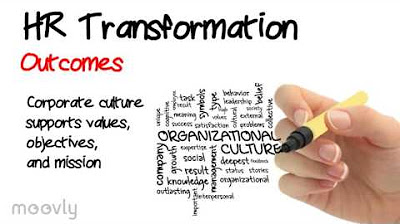What you Need to Know About the HR Business Partner
Summary
TLDRThis Learning Bites episode explores the evolving role of HR Business Partners (HRBPs) as strategic liaisons between HR and business functions. It discusses the shift from administrative tasks to strategic roles, emphasizing the importance of future-ready HRBPs in areas like workforce planning, technology adoption, and culture building. Key competencies for HRBPs include data literacy, business acumen, digital integration, and people advocacy, with additional skills in stakeholder management and communication. The episode encourages continuous learning for HRBPs to align people strategies with business objectives effectively.
Takeaways
- 🔍 HR Business Partners (HRBPs) should act as strategic liaisons between HR and the business, helping to align people strategy with business strategy.
- 📉 57% of C-suite executives view HR as primarily administrative, indicating a need for HRBPs to become more strategic in their roles.
- 🚀 The role of HRBPs is evolving from operational to strategic, with a focus on preparing organizations for future work and HR management.
- 💼 HRBPs need to be coaches and consultants, understanding organizational challenges to provide effective advice and coaching.
- 💹 Business acumen is crucial for HRBPs to connect business challenges with HR activities and outcomes.
- 🏆 HRBPs are instrumental in building a competitive organization by understanding both people and financial operations.
- 👩💼 Empowering leaders is a key responsibility of HRBPs, who should support decision-making and handle employee issues.
- 📊 Data literacy is essential for HRBPs to influence decisions through strategic use of KPIs and contextual understanding of the business.
- 🌐 Strengthening company culture and employee experience is a core responsibility of future-ready HRBPs, focusing on cultural transformation for organizational goals.
- 📈 The four key competencies for effective HRBPs are data literacy, business acumen, digital integration, and people advocacy.
- 🤝 Additional skills for HRBPs include stakeholder management, communication, and dealing with resistance to implement HR interventions.
Q & A
What is the primary role of an HR Business Partner (HRBP)?
-The primary role of an HRBP is to act as a strategic liaison between HR and the business, helping to align an organization's people strategy with its business strategy.
Why do many C-suite executives view HR as an administrative function?
-Many C-suite executives view HR as an administrative function because HRBPs are often bogged down in operational activities, which prevents them from taking on a more strategic role.
How is the role of an HRBP changing in response to the evolving business world?
-The role of an HRBP is shifting from being tactical to more strategy-oriented, with an increasing focus on preparing organizations for the future of work, including reskilling, upskilling, adopting technology, and improving the employee experience.
What are some key responsibilities of future-ready HRBPs?
-Future-ready HRBPs will focus on preparing for the future of work, being a coach and consultant, applying business acumen, building a competitive organization, and empowering leaders.
How can HRBPs use data to influence decisions within the organization?
-HRBPs can use data strategically to track KPIs and drive performance, ensuring decisions are based on evidence rather than gut feelings, and considering both business and cultural contexts.
Why is business acumen important for HRBPs?
-Business acumen is crucial for HRBPs as it enables them to connect business challenges to HR activities and outcomes, helping the organization tackle these challenges effectively.
What does it mean for HRBPs to empower leaders within the organization?
-Empowering leaders means that HRBPs should enable business leaders to make decisions and handle employee issues independently, with HR serving as a backup for emergencies.
What are the four core competencies that every HRBP needs to be effective?
-The four core competencies for effective HRBPs are data literacy, business acumen, digital integration, and people advocacy.
How can HRBPs leverage technology to improve efficiency and outcomes?
-By adopting the right HR technology, HRBPs can free up time from administrative tasks, leading to increased efficiency, better business outcomes, and an improved digital employee experience.
Why is people advocacy an important skill for HRBPs?
-People advocacy is important for HRBPs because it involves advocating for employees, ensuring fair treatment and rewards, which protects the business from lawsuits, unwanted turnover, and unhappy employees.
What additional skills can HRBPs develop to be more effective in their roles?
-Aside from the core competencies, HRBPs can develop skills in stakeholder management, communication and presentation, and dealing with resistance to be more effective in their roles.
Outlines

Cette section est réservée aux utilisateurs payants. Améliorez votre compte pour accéder à cette section.
Améliorer maintenantMindmap

Cette section est réservée aux utilisateurs payants. Améliorez votre compte pour accéder à cette section.
Améliorer maintenantKeywords

Cette section est réservée aux utilisateurs payants. Améliorez votre compte pour accéder à cette section.
Améliorer maintenantHighlights

Cette section est réservée aux utilisateurs payants. Améliorez votre compte pour accéder à cette section.
Améliorer maintenantTranscripts

Cette section est réservée aux utilisateurs payants. Améliorez votre compte pour accéder à cette section.
Améliorer maintenantVoir Plus de Vidéos Connexes
5.0 / 5 (0 votes)






